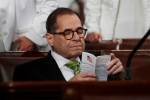NSA spying vote makes strange bedfellows
It’s always a kick when left and right come together to question the power of the federal government.
Nevada’s congressional delegation saw a pair of strange bedfellows on Wednesday, as Republican Rep. Joe Heck and Democratic Rep. Dina Titus voted against an amendment that would have cut funding to the National Security Agency’s massive telephone metadata surveillance program.
Meanwhile, Republican Rep. Mark Amodei voted yes on the amendment, and Democratic Rep. Steven Horsford — home in Las Vegas recovering from major heart surgery – said on Twitter he’d have done the same. The no votes prevailed, 217-205, keeping the funding in place.
Specific explanations varied, but the yes votes said they were concerned about the potential privacy and constitutional concerns raised by a program that collects information on who you call, when and where you make your calls and how long they last. That information is kept in a database that can be queried far into the future.
“Rep. Amodei viewed the vote as an opportunity to send a message about the privacy of American citizens and where the government draws the line,” said Brian Baluta, the congressman’s spokesman. “When someone like (Wisconsin Republican) Rep. Jim Sensenbrenner, one of the original authors of the PATRIOT Act, supports the (NSA funding cut) amendment, it underscores what a troubling situation we have here.”
Horsford, posting to his Twitter account Thursday, said much the same: “I would have voted yes on (the amendment), because we must keep our country safe and preserve our civil liberties at the same time.”
At issue primarily is the Fourth Amendment, which provides that American citizens shall be secure from unreasonable searches of their persons, papers and effects, unless a warrant based upon probable cause has been issued. The NSA program does not require the government to get a warrant before collecting and searching phone data.
And it may be worse than that: At a recent congressional hearing, officials said they might collect other data as well, if it was relevant to a national security investigation. That data could include Internet searches, credit card purchases and hotel stays.
For his part, Heck’s spokesman, Greg Lemon, said the program was a tool to protect the country from terrorist attack. “The … amendment would have eliminated Section 215 of the PATRIOT Act, which we know has thwarted several terrorist plots against the United States,” Lemon wrote in an email. “Congressman Heck believes these programs are critical to maintaining our national security.”
And, perhaps surprisingly, Titus said the same in a written statement: “As we are constantly reminded, there are individuals and organizations who seek to do us harm, both at home and abroad. Las Vegas ... is consistently noted as a potential location for a terrorist attack. I opposed the … amendment because it was a blunt attempt to eliminate a critical intelligence capability when, as the president has noted, a careful and thorough examination of such programs is what is needed.”
There’s no doubt about that. Among the questions we should ask: Is it really necessary to collect and store information on millions of American citizens’ phone calls in order to protect the country? Isn’t there a better use of those funds? Isn’t each piece of data collected from a presumably innocent American against whom the government has no individualized suspicion a violation of the Fourth Amendment? And perhaps most relevant: Should Congress not exercise the power of the purse to stop such constitutionally questionable abuses until such time as these other questions are answered?
In a nation where we’re tracked by our Social Security numbers (a violation of that program’s original promise, by the way); watched by traffic cameras, security cameras and everybody’s cell-phone camera; scanned by license-plate readers; and spied upon whenever we make a phone call, these questions will become all the more urgent. And the bedfellows will get stranger and stranger.
Steve Sebelius is a Review-Journal political columnist and author of the blog SlashPolitics.com. Follow him on Twitter (@SteveSebelius) or reach him at 387-5276 or SSebelius@reviewjournal.com.























